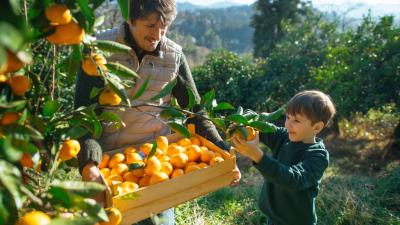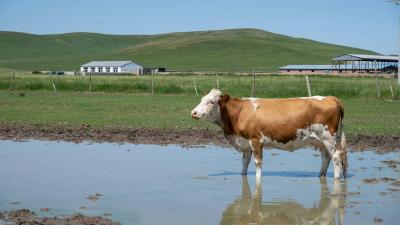Doctors File Complaint Against Slaughterhouse for Lambs

DENVER— The Physicians Committee, a health advocacy nonprofit with 249 doctor members in Colorado, and 17,000 physicians nationwide, has filed a complaint against the Superior Farms lamb slaughterhouse in Denver. The lamb slaughterhouse should be phased out and replaced with a cleaner and more sustainable enterprise such as growing apple, pecan, or peach trees.
“From a doctor’s perspective, it’s important to keep in mind that the slaughterhouse on the banks of the South Platte River in Denver produces red meat from lambs which is high in artery-clogging saturated fat,” says says Roxanne Becker, MBChB, a medical doctor on the staff of Physicians Committee. “Denverites who avoid lamb chops and instead choose healthful plant-based foods can improve heart health, lower blood pressure, and prevent diabetes, among other benefits.”
A recent study with 22 pairs of identical twins found that a plant-based diet improves heart health in as little as eight weeks. The twins following a plant-based diet experienced lower LDL or “bad” cholesterol, and they lost more weight than the twins who ate meat. By contrast, numerous scientific studies link red meat like lamb to heart disease, including a recent review published by researchers at the University of Oxford. Heart disease is a leading cause of death in Colorado.
Prior to being slaughtered at Superior Farms in Denver, lambs are held in pens close to the South Platte River, and according to a former employee, feces from the holding pens enters the river. As a first step in transitioning the slaughterhouse to a cleaner and more sustainable enterprise, the city should require that numerous fruit or nut trees be planted in a buffer zone along the river to capture and filter pollutants. The U.S. Department of Agriculture recommends hazelnut trees for this purpose, and harvesting the nuts would provide income to the landowner. Native pecan trees, could also be planted, and pecans are a good source of protein, iron, calcium, and many other nutrients.
People living in the neighborhoods near the slaughterhouse in Denver have spoken of the overwhelming stench and this could mean that animal byproducts are not properly composted, or not promptly collected by a rendering company. In a recent case in Pennsylvania, neighbors alerted authorities to unbearable odors from a slaughterhouse and inspectors found piles of rotting animal remains. This is another indication that a slaughterhouse, which generates a tremendous amount of waste in the form of animal byproducts, has no place within Denver city limits.
The slaughterhouse in Denver is close to the South Platte River and according to the U.S. Environmental Protection Agency, between 70% and 75% of waters downstream from meat processing facilities are currently harmed by pollutants found in slaughterhouse wastewater.
According to research published in a scientific journal, “Slaughterhouse wastewater pollutants include organic matter such as blood and feces that carry pathogens like E. coli, antibacterial agents (which have been linked to a proliferation of antibiotic-resistant pathogens), pesticide residues, growth-promoting and other drugs, and high nutrient loads that cause algal blooms and ‘dead zones’ in water bodies that are fatal to aquatic life and dangerous to human health.”
There have also been cases of slaughterhouses discharging huge quantities of blood into nearby waterways. In Dallas, Cedar Creek was red from pig blood flowing out of the Columbia Packing Company, and city officials halted operations at the slaughterhouse and sought to shut it down permanently. Slaughterhouse neighbors also spoke of the intrusive stench.
If the slaughterhouse next to the South Platte River is phased out and replaced with an orchard, or a facility for growing mushrooms, the neighborhood would be improved, and river water would become much cleaner. In many parts of the country, livestock facilities are being repurposed to grow food crops, and Colorado could encourage this trend with transition grants like the ones offered by Vermont. In Iowa, the Faaborg brothers are converting the family hog farm to a mushroom-growing operation. Mushrooms are an affordable source of high quality protein and they are grown sustainably with minimal use of water and land.
In its complaint to Elizabeth Babcock, the director of Denver’s Office of Climate Action, Sustainability and Resiliency (CASR), the Physicians Committee points out that sheep and lambs are ruminants that produce methane, a potent planet-warming gas. The World Health Organization says, “Reducing livestock herds would reduce emissions of methane, which is the second largest contributor to global warming after carbon dioxide.” Methane is an efficient heat-trapping gas, but it’s relatively short-lived, so reducing emissions now could help slow global warming.
Growing trees while phasing out livestock can be especially beneficial to the environment since trees absorb carbon dioxide from the atmosphere and release oxygen for us to breathe. Fruit and nut trees that thrive in Colorado can provide income to farmers and healthful food for everyone.
Media Contact
Jeanne Stuart McVey
202-527-7316
jmcvey[at]pcrm.org
Founded in 1985, the Physicians Committee for Responsible Medicine is a nonprofit organization that promotes preventive medicine, conducts clinical research, and encourages higher standards for ethics and effectiveness in education and research.








